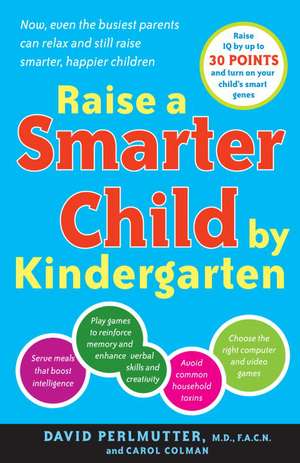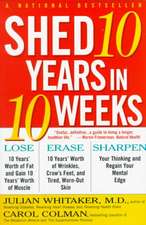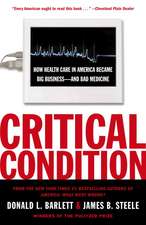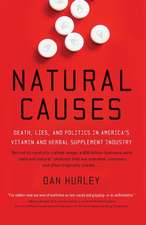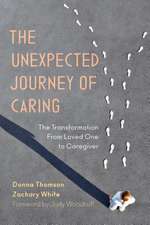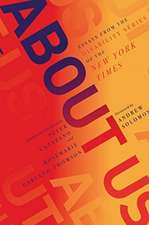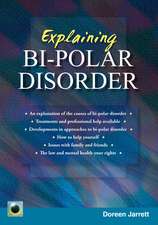Raise a Smarter Child by Kindergarten: Build a Better Brain and Increase IQ Up to 30 Points
Autor Carol Colman, David Perlmutteren Limba Engleză Paperback – 29 feb 2008
Simple games to reinforce memory pathways in the brain
Information on common household products and children’s toys that contain brain-damaging neurotoxins
The right foods and supplements to boost intelligence and turn on your child’s smart genes
How to turn the television, the computer, and video games into educational tools
Proven ways to reduce the risk of your child developing ADD and ADHD
Between birth and age five, your child has up to thirty IQ points at stake. Scientists now know that the human brain is undergoing a constant and dramatic transformation in the first years of life. During this peak time of development, every activity and experience leaves an indelible mark on your baby’s brain, for better or worse. The right kind of stimulation and nutrition will create connections in the brain that promote intelligence and raise IQ. The wrong kinds of activities and foods can stifle intellectual development, destroy brain cells, and leave your child more vulnerable to learning or behavior problems down the road. So, what can you do during the first five years to ensure that your child is primed to excel?
The good news is that raising a smarter child is easier than you think. It doesn’t require making an investment in expensive equipment or high priced tutors. It’s as simple as playing the right games, serving the right foods, and maintaining a brain-enhancing environment in your home by eliminating common household toxins. In Raise a Smarter Child by Kindergarten by Dr. David Perlmutter, you’ll learn easy and highly effective strategies that can vastly improve your child’s brain power and reduce his or her chances of developing ADD and ADHD. For example, you can:
Stimulate Memory: Changing a component on the over-the-crib mobile every week makes the baby compare what was there before to what’s there now, reinforcing memory pathways in the brain that are critical for learning.
Spread out those shots: Schedule more frequent trips to the pediatrician for vaccinations, so that fewer shots are administered at once. Flooding the immune system with a cocktail of different vaccines can damage the nervous system.
Get rid of toxins: Protecting a child from neurotoxins found in foods, toys and even baby bottles can help preserve precious IQ points.
Inside, Dr. Perlmutter provides a scientifically backed food and supplement plan for children and nursing mothers and details the many brain-building activities that you can do with your child. In addition, he reveals the numerous toys and household products that contain harmful, brain-damaging toxins and shows how to identify and combat common childhood problems like ADD and food allergies that may affect your child’s development.
Your job over the first five years is to help your child build the best brain possible. With Dr. Perlmutter’s help, you can mine the countless opportunities you have each day to make your child smarter, happier and better prepared to excel.
Preț: 88.50 lei
Nou
Puncte Express: 133
Preț estimativ în valută:
16.93€ • 17.73$ • 14.01£
16.93€ • 17.73$ • 14.01£
Carte disponibilă
Livrare economică 15-29 martie
Livrare express 01-07 martie pentru 21.20 lei
Preluare comenzi: 021 569.72.76
Specificații
ISBN-13: 9780767923026
ISBN-10: 0767923022
Pagini: 289
Dimensiuni: 132 x 203 x 18 mm
Greutate: 0.27 kg
Editura: BROADWAY BOOKS
ISBN-10: 0767923022
Pagini: 289
Dimensiuni: 132 x 203 x 18 mm
Greutate: 0.27 kg
Editura: BROADWAY BOOKS
Notă biografică
David Perlmutter, M.D., is a board-certified neurologist and founder of the Perlmutter Health Center. He is the author of The Better Brain Book and a recipient of the Linus Pauling Award. Dr. Perlmutter has appeared widely on television and as a speaker. He lives in Naples, Florida. Carol Colman is the co-author of numerous bestselling health and diet books.
Extras
CHAPTER ONE
The Smart Advantage
What does it take to raise a smarter child? What must parents do during the first five years of life to ensure that their child is primed to excel in school and in life?
The good news is, raising a smarter child is easier than you think. It doesn't require making an investment in expensive equipment or high-priced tutors. Nor do you have to devote every waking minute to demanding academic drills. There are easy (and I do mean easy) yet highly effective strategies that can vastly improve your child's brain power. It's as simple as playing the right games with your child, putting the right food on your child's plate, maintaining a brain-enhancing environment in your home, and last but not least, giving your child lots of love.
I'm a neurologist, a physician who specializes in disorders of the brain and nervous system. At my offices at the Perlmutter Health Center in Naples, Florida, I have worked with both children and adults for more than twenty years. I am also a father of two teenage children. Over the past five years, there have been incredible breakthroughs in the field of neurosciences--particularly in the area of early childhood development--that have given us a new understanding of how the brain develops.
Science now tells us that the human brain is unfinished at birth. There's a brief window of opportunity in a child's life when parents can help create a brain that is built for optimal performance. Your child's future depends on how well you do that job. If you do your job well, you will raise a smarter child who will fulfill his or her full intellectual potential.
When I was in medical school, the prevailing scientific view was that the brain you are born with is your brain for life. This belief has now been refuted. New and more effective imaging techniques have provided a window into the brain that has enabled us to see how the brain changes throughout our lifetime. We now know that the human brain is undergoing a constant and dramatic transformation from birth until about age 5 and, to a lesser extent, throughout our entire lives. The brain can be shaped and molded well into adulthood and even into old age, but the most important work is done in early childhood. And that's when parents can make the biggest impact on the lives of their children.
During the peak time of brain development, every activity and experience leaves an indelible mark on your baby's brain, for better or worse. The right kind of stimulation will create connections in the brain that promote intelligence and emotional stability. The wrong kind of stimulation--or lack of stimulation--can stifle intellectual development, destroy brain cells, and leave your child more vulnerable to learning or behavior problems down the road.
Some of you may be thinking: Isn't intelligence largely determined by genetics? Won't smart parents automatically have smart children? And if that's true, what can you do about your child's genes? We now know that for the most part, great brains are made, they are not born. From birth to age 3, up to 30 IQ points are up for grabs. Children may be born with the genetic potential to have a higher than average IQ, but if they are not properly nurtured and nourished during the first few years of life, they will not achieve their full potential. What parents do--or fail to do--can win or lose IQ points.
DON'T LET YOUR CHILD MISS OUT
Lots of well-meaning parents are missing key opportunities to enhance their children's intellectual and emotional well-being, not because they are derelict in their duties, but because they are not fully informed.
There are simple ways you can make your child smarter and make sure that those precious IQ points don't go down the drain.
• Breast-feeding your baby for the first twelve months of life can boost her IQ by up to 8 points. If you can't breast-feed or have to stop early, be sure to use a commercial infant formula that is fortified with brain-boosting nutrients.
• Feed your toddler an optimal diet to enhance brain growth. Even a slight deficiency in a key vitamin, mineral, or nutrient (such as iron or iodine) during the time when the brain is going through its spectacular growth spurt can result in a lower IQ, poor test scores, depression, and even teen drug abuse down the road.
• Engage your baby in mentally stimulating activities from the first few weeks of life through her entire childhood. The right games and activities can improve her memory, boost her mental capacity, and hone her critical thinking skills.
• Limit the amount of time your child spends watching TV and DVDs and playing video games. Excess time spent watching TV and playing video games during early childhood adds up to poor grades at school.
• Introduce your child to formal musical training by age 4. It will make him a stronger math and science student.
• Early training on a computer can improve your child's cognitive function and better prepare him for school.
• Protect your child from common brain toxins found in food, toys, clothing, and even your own backyard that can cause learning problems and rob her of IQ points.
• Raise your child in a warm, loving, low-stress environment with attentive caregivers.
Every choice a parent makes, from what to feed a child, to how much TV a child watches, to the choice of caregiver can profoundly affect a child's brain growth and development. And so much of your child's brain development is under your control.
SO WHAT ABOUT GENETICS?
And of course, there's a child's genetic makeup, which he gets from you, his parents. Genetics does play an important role in creating a smart brain, but not necessarily in the way that you would expect. And this is probably going to really surprise many of you--we now know that you actually have far more control over your genes than was once believed.
A healthy baby is born with the raw material to make a great brain, but there's still a lot of work to be done. The newborn brain has 100 billion brain cells (called neurons), but they are unable to communicate with each other very well. During the first one thousand days of life, neurons must learn to talk to each other by forming the vital connections--the neural "pathways to success"--that provide the foundation for language, vision, hearing, learning, feeling, and thinking. Enhancing these connections can spell the difference between a good brain and a great brain. A smart brain is hardwired to think, learn, process, and retrieve information quickly and efficiently. It's true that many of the processes of brain development are gene dependent, but it's also true that we have a great deal of say over how those genes behave.
It was once believed that if a child was lucky enough to have smart parents, he would inherit smart genes and be born with a great brain. Of course, it doesn't always work that way in real life because as we've now learned, there's so much more to this story than just pure genetics. Environment as well as genetics plays an important role in intelligence and future academic success. Babies who are loved, well nurtured, and well nourished grow up to be adults with higher IQs compared to babies who were not as well cared for. What we didn't fully appreciate in the past was the relationship between genes and environment, or more specifically, how it was possible for environment to affect genes, and therefore IQ.
We now have a much better understanding of the interrelationship between genes and the environment. Genes may determine the number and quality of brain cells you are born with, but environmental influences over which you as a parent have control turn on and off the very genes involved in brain development. More importantly, we now know that under the right circumstances, it is possible to turn on the right genes, the genes that will make a brain smarter. And I mean this literally.
Genes do their work by directing the production of proteins that are critical for brain development. These special proteins regulate the wiring between brain cells that ultimately makes the brain smarter, and they are especially important during this period of peak brain development. But what controls the smart genes in the first place? Lots of things, including regular mental stimulation, physical activity, the right foods and nutrients, and the experience of feeling loved and emotionally secure.
We also know that a negative environment can turn on bad genes and/or prevent good genes from being activated. Children who are fed a less than optimal diet, not raised in a mentally stimulating environment, exposed to dangerous chemicals in the environment, or raised in a stressful household are not as likely to achieve their full intellectual potential as children raised under better conditions.
WHAT ARE BRAIN-BUILDING ACTIVITIES?
Brain-building activities are those that challenge the brain, thereby stimulating the neurons to make more connections, which will make the brain stronger, faster, more efficient, and ultimately smarter. The point of these activities is to train the brain how to think, not what to think. It's about building up the brain's capacity so that your child will be better able to process and utilize information for her entire life. The right kind of stimulation at this pivotal time will create an optimal brain, one that will give your child better tools to perform well in the classroom.
The achievable goal during this critical window of opportunity is to create the fastest, most efficient, and highest-capacity brain, setting the stage for future success. Much as we all strive for the fastest computer with the most storage capacity, you can achieve the same results with your child's brain. Again, the goal is not to overwhelm your child's brain with as many facts as possible before she starts kindergarten, but rather to create a brain that stores facts efficiently and, most importantly, is able to retrieve them easily. Essentially, the goal should not be what she learns, but how she learns.
During the first five years of life, when the brain is undergoing rapid development, children should spend most of their waking hours engaged in brain-building endeavors. Unfortunately, children are devoting too much time to activities that dull their brains, deaden their senses, and put their future academic careers at risk. Watching television or DVDs--even educational programs--for hours on end, as many children do, is not good for a growing brain. Nor is playing video games for hours at a time. But don't get me wrong--I'm not suggesting small children shouldn't have any fun or that they should be subjected to a rigorous academic setting. That would be a terrible mistake. Children learn best when they are happy, relaxed, and stimulated. That's one of the reasons why play is one of the best activities for young children.
It may surprise you to learn that physical activity is also a terrific brain builder. It boosts levels of the growth hormone in the brain that makes better brain cells. But perhaps the most brain-enhancing activity of all is imaginative play, the kind of play that comes naturally to children when they have the time and space to pursue it.
A SMART BRAIN IS A CREATIVE BRAIN
In recent years, there has been an emphasis on beginning academic training for children at younger and younger ages. We live in a very competitive world, and parents are afraid that if they don't push their children to learn how to read or how to do simple arithmetic at very early ages, they will fall behind and not do well in elementary school. Nothing could be further from the truth. The choice of early academic intervention, especially the kind of "drill and test" activities that are so popular today in many preschools, is the wrong approach. Instead of building great brains, we are merely creating tape recorders that can regurgitate information but cannot synthesize it to come up with new ideas. At a time when a child should be encouraged to be creative, which is the foundation for advanced thinking, many children are being loaded down with facts. More and more preschools are adopting a curriculum that pushes children into early academics. More and more elementary schools are eliminating creative outlets such as recess and music and placing more emphasis on academics, or more specifically, "teaching for test." I have nothing against academics, and I certainly believe that children need to be taught the basics, but, ultimately, this trend is going to result in poor performance at school in upper grades where critical thinking is essential. There is no scientific evidence that the push to engage preschool-age children in early academics actually works, and in point of fact, there is some evidence that they may turn out to be more stressed and less creative.
Any child can memorize his ABCs or learn to count if he is drilled long and hard enough, but these are not highly effective brain-building activities. It's far more important for the developing brain to learn the symbolic nature of letters and words than how to spell, as well as to fully understand what numbers mean and how to identify different shapes. You want your child to understand what these letters represent--that they are symbols and that they are made of shapes, and that numbers are also symbols made from shapes, and each of these symbols means something different.
Creativity is at the core of all problem solving, whether you are solving a math problem, writing an essay, or designing a science project. For example, if your child is confronted with a new challenge, such as a difficult math problem or a challenging essay question, what does he need to succeed? First, he must be comfortable with being in a novel and challenging situation. This comfort level is fostered during the first five years by allowing children to explore challenging situations, engage in creative play, and learn that failure is an option. In other words, it's okay to take intellectual risks. Next, his brain connections need to function at peak performance, allowing him to draw upon a variety of types of stored information from past experiences to find solutions to the new problem at hand. It could be solving a math problem, writing a song, reading a poem with understanding . . . it all requires creativity.
PREVENTING PROBLEMS DOWN THE ROAD
This book is not only about learning to develop your child's full intellectual potential--I also believe the techniques described here can help prevent many of the learning and behavior problems that are so prevalent today. Once rare, conditions such as attention deficit disorder (ADD) and attention deficit hyperactivity disorder (ADHD) are becoming epidemic, affecting 10 to 12 percent of all school-age children. Many children are brought to me by their desperate parents after they have been diagnosed with learning or behavior disorders that make it difficult if not impossible for them to do well in school and in life. I see a lot of unhappy kids who are disruptive, easily distracted, and frustrated with their lives. They don't have the discipline to sit still in a classroom or to learn how to read, or the social skills to maintain friendships. By age 5, they feel like failures, and very often, so do their parents. Their parents feel that they have no choice but to put their children on strong psychoactive drugs and are often coerced into doing so by teachers. I show these parents a better way to treat their children's problems than drugging them into submission. Simple changes in diet, different approaches to discipline, and improved nutrient intake through supplements can make a huge difference in these children's lives. I only wish that I could have gotten to these parents earlier, long before their children began having these problems in the first place, because, as you will soon read, problems such as ADHD are almost uniformly preventable and manageable without drugs.
THE ROLE OF PARENTS
Your job over the first five years of your child's life is to help her develop the best brain possible. There are countless opportunities throughout the day that can help make her smarter, happier, and better prepared for the world. Even if you don't have a lot of time, you can still find a few minutes every day to play a brain-stimulating game with your child, read to your child, and sing to your child. You can support her efforts to be creative by providing a rich home environment in which she can engage in imaginative play. You can make sure that your child lives and plays in as toxin-free and safe an environment as possible, and that she is getting enough brain-building nutrients.
Don't let your child miss out on this once-in-a-lifetime opportunity.
HOW TO USE THIS BOOK
How to Raise a Smarter Child by Kindergarten is divided into six parts.
Part I, "A Brief Window of Opportunity," describes the latest scientific breakthroughs in brain development and explains how you can use this information to help your child.
Part II, "Sharpening Your Child's Mind from Crib to Classroom," provides specific activities designed to build a better brain as well as offering guidelines for television, video games, and computers.
Part III, "Nutrition for a Smarter Brain," tells you everything you need to know about what to feed your child's developing brain to make it smarter.
Part IV, "Creating a Brain-Enhancing Environment for Your Child," alerts you to common toxins found in homes, schools, and playgrounds that can harm a developing brain, and tells you how to keep your children as toxin free as possible.
Part V, "The Brain-Body Connection," covers common medical procedures and conditions that can harm your child's brain. It includes chapters on asthma, ear infections, gluten sensitivity, snoring and sleep problems, head injuries, and vaccinations.
Part VI, "Fighting ADHD by Building a Better Brain," shows how to identify the risk factors for ADHD early, how to contain small problems before they become big ones, and what alternatives are available to the strong prescription medicine typically prescribed for this problem.
From the Hardcover edition.
The Smart Advantage
What does it take to raise a smarter child? What must parents do during the first five years of life to ensure that their child is primed to excel in school and in life?
The good news is, raising a smarter child is easier than you think. It doesn't require making an investment in expensive equipment or high-priced tutors. Nor do you have to devote every waking minute to demanding academic drills. There are easy (and I do mean easy) yet highly effective strategies that can vastly improve your child's brain power. It's as simple as playing the right games with your child, putting the right food on your child's plate, maintaining a brain-enhancing environment in your home, and last but not least, giving your child lots of love.
I'm a neurologist, a physician who specializes in disorders of the brain and nervous system. At my offices at the Perlmutter Health Center in Naples, Florida, I have worked with both children and adults for more than twenty years. I am also a father of two teenage children. Over the past five years, there have been incredible breakthroughs in the field of neurosciences--particularly in the area of early childhood development--that have given us a new understanding of how the brain develops.
Science now tells us that the human brain is unfinished at birth. There's a brief window of opportunity in a child's life when parents can help create a brain that is built for optimal performance. Your child's future depends on how well you do that job. If you do your job well, you will raise a smarter child who will fulfill his or her full intellectual potential.
When I was in medical school, the prevailing scientific view was that the brain you are born with is your brain for life. This belief has now been refuted. New and more effective imaging techniques have provided a window into the brain that has enabled us to see how the brain changes throughout our lifetime. We now know that the human brain is undergoing a constant and dramatic transformation from birth until about age 5 and, to a lesser extent, throughout our entire lives. The brain can be shaped and molded well into adulthood and even into old age, but the most important work is done in early childhood. And that's when parents can make the biggest impact on the lives of their children.
During the peak time of brain development, every activity and experience leaves an indelible mark on your baby's brain, for better or worse. The right kind of stimulation will create connections in the brain that promote intelligence and emotional stability. The wrong kind of stimulation--or lack of stimulation--can stifle intellectual development, destroy brain cells, and leave your child more vulnerable to learning or behavior problems down the road.
Some of you may be thinking: Isn't intelligence largely determined by genetics? Won't smart parents automatically have smart children? And if that's true, what can you do about your child's genes? We now know that for the most part, great brains are made, they are not born. From birth to age 3, up to 30 IQ points are up for grabs. Children may be born with the genetic potential to have a higher than average IQ, but if they are not properly nurtured and nourished during the first few years of life, they will not achieve their full potential. What parents do--or fail to do--can win or lose IQ points.
DON'T LET YOUR CHILD MISS OUT
Lots of well-meaning parents are missing key opportunities to enhance their children's intellectual and emotional well-being, not because they are derelict in their duties, but because they are not fully informed.
There are simple ways you can make your child smarter and make sure that those precious IQ points don't go down the drain.
• Breast-feeding your baby for the first twelve months of life can boost her IQ by up to 8 points. If you can't breast-feed or have to stop early, be sure to use a commercial infant formula that is fortified with brain-boosting nutrients.
• Feed your toddler an optimal diet to enhance brain growth. Even a slight deficiency in a key vitamin, mineral, or nutrient (such as iron or iodine) during the time when the brain is going through its spectacular growth spurt can result in a lower IQ, poor test scores, depression, and even teen drug abuse down the road.
• Engage your baby in mentally stimulating activities from the first few weeks of life through her entire childhood. The right games and activities can improve her memory, boost her mental capacity, and hone her critical thinking skills.
• Limit the amount of time your child spends watching TV and DVDs and playing video games. Excess time spent watching TV and playing video games during early childhood adds up to poor grades at school.
• Introduce your child to formal musical training by age 4. It will make him a stronger math and science student.
• Early training on a computer can improve your child's cognitive function and better prepare him for school.
• Protect your child from common brain toxins found in food, toys, clothing, and even your own backyard that can cause learning problems and rob her of IQ points.
• Raise your child in a warm, loving, low-stress environment with attentive caregivers.
Every choice a parent makes, from what to feed a child, to how much TV a child watches, to the choice of caregiver can profoundly affect a child's brain growth and development. And so much of your child's brain development is under your control.
SO WHAT ABOUT GENETICS?
And of course, there's a child's genetic makeup, which he gets from you, his parents. Genetics does play an important role in creating a smart brain, but not necessarily in the way that you would expect. And this is probably going to really surprise many of you--we now know that you actually have far more control over your genes than was once believed.
A healthy baby is born with the raw material to make a great brain, but there's still a lot of work to be done. The newborn brain has 100 billion brain cells (called neurons), but they are unable to communicate with each other very well. During the first one thousand days of life, neurons must learn to talk to each other by forming the vital connections--the neural "pathways to success"--that provide the foundation for language, vision, hearing, learning, feeling, and thinking. Enhancing these connections can spell the difference between a good brain and a great brain. A smart brain is hardwired to think, learn, process, and retrieve information quickly and efficiently. It's true that many of the processes of brain development are gene dependent, but it's also true that we have a great deal of say over how those genes behave.
It was once believed that if a child was lucky enough to have smart parents, he would inherit smart genes and be born with a great brain. Of course, it doesn't always work that way in real life because as we've now learned, there's so much more to this story than just pure genetics. Environment as well as genetics plays an important role in intelligence and future academic success. Babies who are loved, well nurtured, and well nourished grow up to be adults with higher IQs compared to babies who were not as well cared for. What we didn't fully appreciate in the past was the relationship between genes and environment, or more specifically, how it was possible for environment to affect genes, and therefore IQ.
We now have a much better understanding of the interrelationship between genes and the environment. Genes may determine the number and quality of brain cells you are born with, but environmental influences over which you as a parent have control turn on and off the very genes involved in brain development. More importantly, we now know that under the right circumstances, it is possible to turn on the right genes, the genes that will make a brain smarter. And I mean this literally.
Genes do their work by directing the production of proteins that are critical for brain development. These special proteins regulate the wiring between brain cells that ultimately makes the brain smarter, and they are especially important during this period of peak brain development. But what controls the smart genes in the first place? Lots of things, including regular mental stimulation, physical activity, the right foods and nutrients, and the experience of feeling loved and emotionally secure.
We also know that a negative environment can turn on bad genes and/or prevent good genes from being activated. Children who are fed a less than optimal diet, not raised in a mentally stimulating environment, exposed to dangerous chemicals in the environment, or raised in a stressful household are not as likely to achieve their full intellectual potential as children raised under better conditions.
WHAT ARE BRAIN-BUILDING ACTIVITIES?
Brain-building activities are those that challenge the brain, thereby stimulating the neurons to make more connections, which will make the brain stronger, faster, more efficient, and ultimately smarter. The point of these activities is to train the brain how to think, not what to think. It's about building up the brain's capacity so that your child will be better able to process and utilize information for her entire life. The right kind of stimulation at this pivotal time will create an optimal brain, one that will give your child better tools to perform well in the classroom.
The achievable goal during this critical window of opportunity is to create the fastest, most efficient, and highest-capacity brain, setting the stage for future success. Much as we all strive for the fastest computer with the most storage capacity, you can achieve the same results with your child's brain. Again, the goal is not to overwhelm your child's brain with as many facts as possible before she starts kindergarten, but rather to create a brain that stores facts efficiently and, most importantly, is able to retrieve them easily. Essentially, the goal should not be what she learns, but how she learns.
During the first five years of life, when the brain is undergoing rapid development, children should spend most of their waking hours engaged in brain-building endeavors. Unfortunately, children are devoting too much time to activities that dull their brains, deaden their senses, and put their future academic careers at risk. Watching television or DVDs--even educational programs--for hours on end, as many children do, is not good for a growing brain. Nor is playing video games for hours at a time. But don't get me wrong--I'm not suggesting small children shouldn't have any fun or that they should be subjected to a rigorous academic setting. That would be a terrible mistake. Children learn best when they are happy, relaxed, and stimulated. That's one of the reasons why play is one of the best activities for young children.
It may surprise you to learn that physical activity is also a terrific brain builder. It boosts levels of the growth hormone in the brain that makes better brain cells. But perhaps the most brain-enhancing activity of all is imaginative play, the kind of play that comes naturally to children when they have the time and space to pursue it.
A SMART BRAIN IS A CREATIVE BRAIN
In recent years, there has been an emphasis on beginning academic training for children at younger and younger ages. We live in a very competitive world, and parents are afraid that if they don't push their children to learn how to read or how to do simple arithmetic at very early ages, they will fall behind and not do well in elementary school. Nothing could be further from the truth. The choice of early academic intervention, especially the kind of "drill and test" activities that are so popular today in many preschools, is the wrong approach. Instead of building great brains, we are merely creating tape recorders that can regurgitate information but cannot synthesize it to come up with new ideas. At a time when a child should be encouraged to be creative, which is the foundation for advanced thinking, many children are being loaded down with facts. More and more preschools are adopting a curriculum that pushes children into early academics. More and more elementary schools are eliminating creative outlets such as recess and music and placing more emphasis on academics, or more specifically, "teaching for test." I have nothing against academics, and I certainly believe that children need to be taught the basics, but, ultimately, this trend is going to result in poor performance at school in upper grades where critical thinking is essential. There is no scientific evidence that the push to engage preschool-age children in early academics actually works, and in point of fact, there is some evidence that they may turn out to be more stressed and less creative.
Any child can memorize his ABCs or learn to count if he is drilled long and hard enough, but these are not highly effective brain-building activities. It's far more important for the developing brain to learn the symbolic nature of letters and words than how to spell, as well as to fully understand what numbers mean and how to identify different shapes. You want your child to understand what these letters represent--that they are symbols and that they are made of shapes, and that numbers are also symbols made from shapes, and each of these symbols means something different.
Creativity is at the core of all problem solving, whether you are solving a math problem, writing an essay, or designing a science project. For example, if your child is confronted with a new challenge, such as a difficult math problem or a challenging essay question, what does he need to succeed? First, he must be comfortable with being in a novel and challenging situation. This comfort level is fostered during the first five years by allowing children to explore challenging situations, engage in creative play, and learn that failure is an option. In other words, it's okay to take intellectual risks. Next, his brain connections need to function at peak performance, allowing him to draw upon a variety of types of stored information from past experiences to find solutions to the new problem at hand. It could be solving a math problem, writing a song, reading a poem with understanding . . . it all requires creativity.
PREVENTING PROBLEMS DOWN THE ROAD
This book is not only about learning to develop your child's full intellectual potential--I also believe the techniques described here can help prevent many of the learning and behavior problems that are so prevalent today. Once rare, conditions such as attention deficit disorder (ADD) and attention deficit hyperactivity disorder (ADHD) are becoming epidemic, affecting 10 to 12 percent of all school-age children. Many children are brought to me by their desperate parents after they have been diagnosed with learning or behavior disorders that make it difficult if not impossible for them to do well in school and in life. I see a lot of unhappy kids who are disruptive, easily distracted, and frustrated with their lives. They don't have the discipline to sit still in a classroom or to learn how to read, or the social skills to maintain friendships. By age 5, they feel like failures, and very often, so do their parents. Their parents feel that they have no choice but to put their children on strong psychoactive drugs and are often coerced into doing so by teachers. I show these parents a better way to treat their children's problems than drugging them into submission. Simple changes in diet, different approaches to discipline, and improved nutrient intake through supplements can make a huge difference in these children's lives. I only wish that I could have gotten to these parents earlier, long before their children began having these problems in the first place, because, as you will soon read, problems such as ADHD are almost uniformly preventable and manageable without drugs.
THE ROLE OF PARENTS
Your job over the first five years of your child's life is to help her develop the best brain possible. There are countless opportunities throughout the day that can help make her smarter, happier, and better prepared for the world. Even if you don't have a lot of time, you can still find a few minutes every day to play a brain-stimulating game with your child, read to your child, and sing to your child. You can support her efforts to be creative by providing a rich home environment in which she can engage in imaginative play. You can make sure that your child lives and plays in as toxin-free and safe an environment as possible, and that she is getting enough brain-building nutrients.
Don't let your child miss out on this once-in-a-lifetime opportunity.
HOW TO USE THIS BOOK
How to Raise a Smarter Child by Kindergarten is divided into six parts.
Part I, "A Brief Window of Opportunity," describes the latest scientific breakthroughs in brain development and explains how you can use this information to help your child.
Part II, "Sharpening Your Child's Mind from Crib to Classroom," provides specific activities designed to build a better brain as well as offering guidelines for television, video games, and computers.
Part III, "Nutrition for a Smarter Brain," tells you everything you need to know about what to feed your child's developing brain to make it smarter.
Part IV, "Creating a Brain-Enhancing Environment for Your Child," alerts you to common toxins found in homes, schools, and playgrounds that can harm a developing brain, and tells you how to keep your children as toxin free as possible.
Part V, "The Brain-Body Connection," covers common medical procedures and conditions that can harm your child's brain. It includes chapters on asthma, ear infections, gluten sensitivity, snoring and sleep problems, head injuries, and vaccinations.
Part VI, "Fighting ADHD by Building a Better Brain," shows how to identify the risk factors for ADHD early, how to contain small problems before they become big ones, and what alternatives are available to the strong prescription medicine typically prescribed for this problem.
From the Hardcover edition.
Recenzii
“Raise a Smarter Child by Kindergarten is a revolutionary guide to optimal childhood development. Dr. Perlmutter provides parents the everyday tools they need to give their children the best possible start in life, and actionable recommendations to put them on the road to success.”
—Andrew Weil, M.D.
“Dr. David Perlmutter has been a leading–edge neurologist for years and this book contains information that every parent needs to know.”
—Christiane Northrup, M.D., author of The Wisdom of Menopause
Give your child a head start that will last a lifetime, Raise a Smarter Child by Kindergarten should be required reading for all new parents.”
—Julian Whitaker, M.D., founder of the Whitaker Wellness Institute
“If it were up to me, every hospital and obstetrician would be required to provide a copy of this book to every new set of parents.”
— Bernie Siegel, M.D.
—Andrew Weil, M.D.
“Dr. David Perlmutter has been a leading–edge neurologist for years and this book contains information that every parent needs to know.”
—Christiane Northrup, M.D., author of The Wisdom of Menopause
Give your child a head start that will last a lifetime, Raise a Smarter Child by Kindergarten should be required reading for all new parents.”
—Julian Whitaker, M.D., founder of the Whitaker Wellness Institute
“If it were up to me, every hospital and obstetrician would be required to provide a copy of this book to every new set of parents.”
— Bernie Siegel, M.D.
Descriere
An acclaimed neurologist offers tools to help parents boost children's intelligence and reduce the risk of their developing ADD and ADHD. In addition, he reveals toys and household products that contain harmful, brain-damaging toxins and shows how to identify and combat common childhood problems that may affect a child's development.
